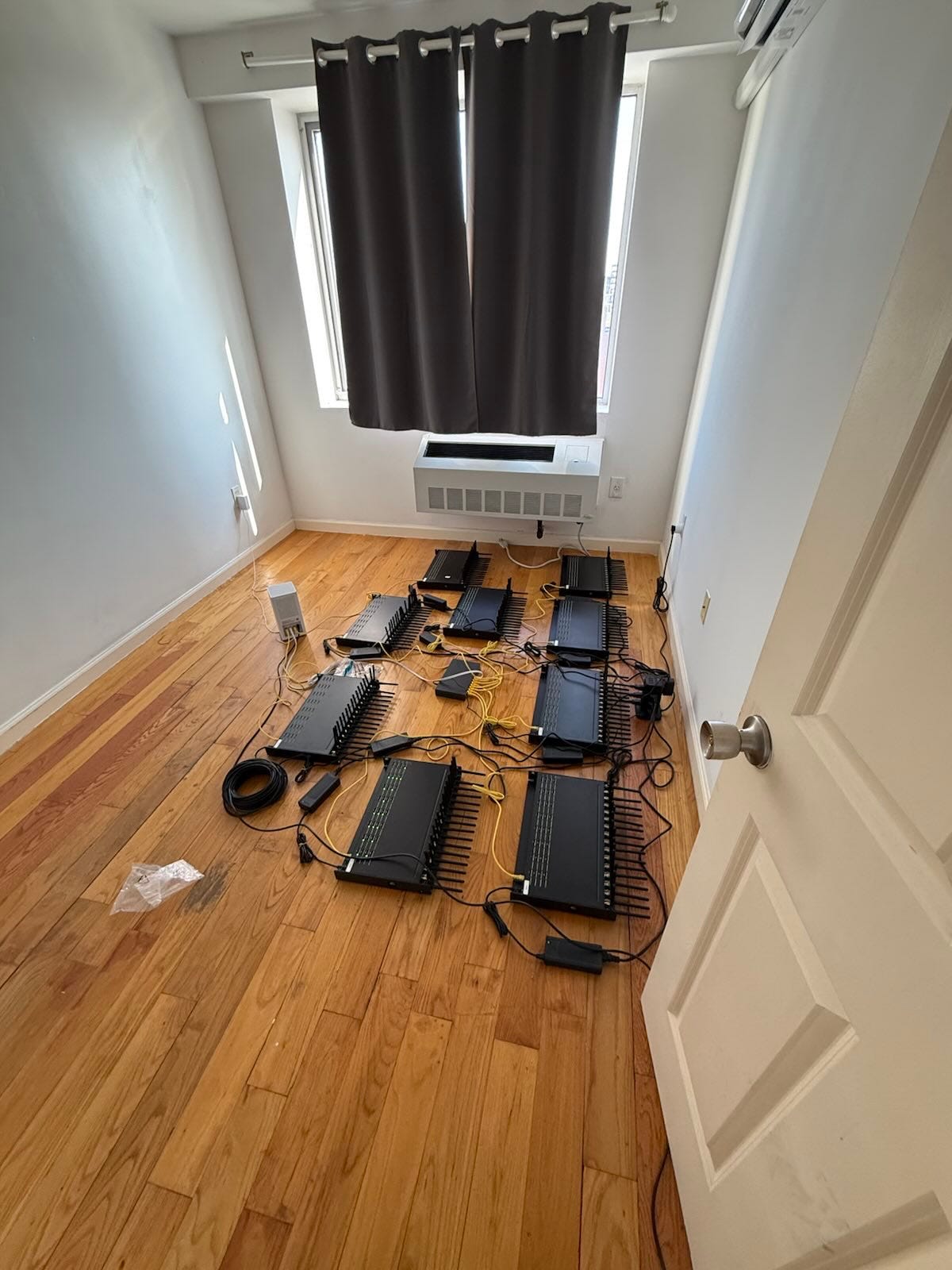Prepared Brief: Italian Port Blockades Escalate, Secret Service Foils Telecom Threat
23 September 2025 | 09:07 CDT
Analyst Insight
The posture today is strained with rising threats overseas and quiet but watchful conditions at home.
A nationwide strike and violent pro‑Palestinian protests in Italy blocked multiple ports and rail stations for hours; this is the second major maritime disruption in a week and points to mounting civil unrest spilling into global supply lines.
Cyber risks are also escalating: a ransomware attack crippled check‑in systems across European airports, and the U.S. Secret Service dismantled a clandestine telecom network capable of shutting down cell towers near the United Nations General Assembly.
Meanwhile, Hurricane Gabrielle rapidly intensified to a Category 4 storm in the Atlantic, though it currently poses only a coastal rip‑current threat to the U.S.
These overlapping hazards demonstrate the need to monitor international flashpoints and harden communications infrastructure before compounding effects strain emergency response capabilities.
Domestic Security & Civil Unrest
No major protests or active shooter incidents reported in the U.S. Law enforcement and emergency service channels report routine operations over the last 24 hours; no large demonstrations, riots, or targeted attacks were documented.
Why it matters: with attention focused abroad, domestic conditions are stable, but vigilance remains essential in case overseas events inspire copycat actions.
Infrastructure & Grid Alerts
European airports disrupted by a ransomware attack on Collins Aerospace: The EU cybersecurity agency confirmed that a ransomware hack against Collins Aerospace’s check‑in systems crippled airports across Europe and stranded thousands of travelers. Analysts warn that high‑profile attacks targeting critical transportation networks are becoming more brazen and could be used to cause serious injury or deaths if directed at healthcare or U.S. infrastructure.
Why it matters: the incident demonstrates increasing cybercriminals’ willingness to hit major targets; U.S. airports and airlines should verify backups and network segmentation to mitigate similar attacks.
Secret Service seizes telecom threat network around U.N. General Assembly: Agents dismantled a network of more than 300 SIM servers and 100,000 SIM cards within 35 miles of New York City that had been used to threaten senior U.S. officials. The devices could have disabled cell towers, enabled denial-of-service attacks, and allowed anonymous, encrypted communications between nation-state threat actors and criminal networks. Early forensic analysis shows communications between known threat actors and individuals of interest to federal law enforcement. The U.S. Secret Service’s Advanced Threat Interdiction Unit led the operation; DHS Homeland Security Investigations, DOJ, ODNI, and NYPD provided technical support.
Why it matters: the operation removed an imminent telecom threat near the U.N. summit and highlights vulnerabilities in urban communications that adversaries may try to exploit at future high-profile events.
SonicWall security incident prompts CISA advisory: A malicious actor used brute‑force techniques to access MySonicWall cloud backup files, obtaining encrypted credentials and configuration details for some customers’ firewall devices. CISA urges SonicWall users to verify if their devices are at risk and to apply containment and remediation measures.
Why it matters: compromised firewalls could be used to pivot into government or corporate networks; organizations should follow CISA guidance and update credentials.
No major domestic utility or power grid disruptions were reported.
Why it matters: normal service conditions mean residents can maintain routine operations, but the above cyber incidents show the importance of contingency plans.
Extreme Weather & Natural Hazards
Hurricane Gabrielle rapidly intensifies to Category 4: Gabrielle doubled in strength within 24 hours, reaching 140 mph wind. The storm is turning east away from Bermuda and the U.S., but it is generating high surf and rip currents from North Carolina to New England that will persist through Tuesday.
Why it matters: although no landfall is expected, beachgoers should avoid swimming, and mariners should remain cautious; the rapid intensification highlights the volatile nature of this hurricane season.
Texas wildfires remain moderate: The Texas A&M Forest Service reports the state at Preparedness Level 2; since Friday the agency responded to eight wildfires.
Why it matters: current conditions are manageable, but ongoing drought and heat could elevate risk; residents should heed burn bans and prepare for potential evacuations if conditions worsen.
No significant earthquakes or other natural hazards reported in the past 24 hours.
Why it matters: stable seismic conditions allow emergency resources to focus on hurricane preparedness and fire containment.
Border & Immigration
No major U.S. border security incidents reported. U.S. Customs and Border Protection (CBP) reports routine operations without large surges or interdictions.
Why it matters: steady conditions mean no immediate impact on border wait times or inland security posture; however, shifting international events could alter migration patterns in coming days.
Church, Mission & Civilian Safety
No global incidents affecting church, missions, or civilian teams. International mission networks and humanitarian groups have not reported kidnappings, harassment, or targeted attacks within the last 24 hours.
Why it matters: travel security risks remain low for U.S. faith-based workers, but teams should continue to monitor local conditions, especially in regions experiencing protests or political instability.
International Flashpoints
Italian port blockades and clashes: Tens of thousands of protesters in Italy held a nationwide strike against Israel’s Gaza offensive, blocking ports in Genoa, Livorno, Venice, and Trieste and disrupting traffic in Milan, Rome, and Bologna. Clashes at Milan’s central station saw police deploy tear gas; more than ten protesters were arrested, and about 60 officers were injured. Prime Minister Giorgia Meloni condemned the violence and warned of supply disruptions.
Why it matters: Italian ports are key gateways for Mediterranean shipping; blockades could delay transatlantic cargo, including food and industrial goods, and may inspire similar protests in other European ports.
Ransomware cripples European airports: The Collins Aerospace attack mentioned above not only illustrates cyber risk but also disrupted passenger travel and logistics across Europe.
Why it matters: prolonged check‑in disruptions hamper international business travel and cargo flights, potentially affecting just-in-time supply chains.
Secret Service telecom seizure (international context): As noted, the seized network near the UN may have been controlled by nation-state threat actors.
Why it matters: this highlights geopolitical tensions around the U.N. General Assembly and shows that adversaries are willing to deploy unconventional tools inside the U.S.
Supply Chain & Liberty Watch
Supply Chain
Disruptions from Italian strike: Dockworkers’ blockades in Genoa, Livorno, Venice, and Trieste hampered cargo movement.
Immediate effect: shipping delays are likely for European exports bound for the U.S.; importers should prepare for late arrivals of automotive parts, wine, and manufactured goods. Continued demonstrations could create container backlogs and raise shipping costs.
Airport cyberattack: As noted, the ransomware incident delayed flights and luggage handling across Europe.
Immediate effect: companies relying on just-in-time air freight should expect delays of 1‑2 days; logistics managers should reroute shipments or build in buffer time.
Liberty & Policy
No new domestic legal rulings impacting Second Amendment or privacy rights were reported in the last day.
Why it matters: with federal courts quiet, there are no immediate changes to firearm regulations or surveillance laws, but forthcoming legislative sessions may revisit these issues.
Signals to Monitor
Further port closures in Europe – additional strikes or protests in Italy or elsewhere could deepen supply-chain disruptions; monitor for similar actions in Spain, France, or Greece.
Trajectory change of Hurricane Gabrielle or formation of new storms – any westward turn toward the U.S. East Coast or rapid development of Invest 94L could require accelerated storm preparations.
Evidence of linked cyber campaigns – watch for reports of ransomware targeting U.S. airports, rail systems, or energy companies following the European airport attack, and monitor CISA advisories for new vulnerabilities.
Domestic protest triggers – significant developments in the Middle East or high-profile court decisions could galvanize demonstrations in U.S. cities; monitor social media for event calls.
Red Flags
Gabrielle forecast cone shifts toward U.S. coastline – initiate storm prep plans, secure property, and review evacuation routes.
Multiple U.S. airports report check-in system outages – suspect a coordinated cyberattack; limit non-essential travel and prepare for prolonged flight cancellations.
Italian strikes spread to other European ports, or U.S. port workers announce solidarity action – anticipate severe cargo bottlenecks; accelerate procurement of critical supplies.
CISA issues emergency directive for firewall or telecom vulnerabilities – patch systems immediately and enact contingency communications procedures.
Preparedness Action Items
Review cyber defenses today: ensure all organization firewalls and VPNs are updated, enforce multi-factor authentication, and disable unused remote access. Confirm continuity plans for check-in and reservation systems before end of day.
Monitor hurricane updates and refresh go-kits: check the National Hurricane Center every six hours; secure loose outdoor items and avoid swimming along the East Coast today and tomorrow. Top off fuel and test generators by tonight.
Prepare for shipping delays: businesses expecting goods from Europe should contact freight forwarders today to verify departure times and consider air alternatives; households should restock non-perishable foods and essentials within 48 hours.
Stay informed on international protests: travelers to Italy or Europe should plan for potential rail and port closures, avoid demonstration areas, and maintain flexible itineraries.
Verify mission and travel security plans: churches and aid organizations should review evacuation routes and communication protocols for teams overseas, especially in Europe and the Mediterranean.
Preparedness Focus of the Day (Optional)
Cyber Hygiene for Individuals: Given the recent surge in high-profile cyberattacks, residents should take simple steps to protect personal devices: enable automatic updates on phones and computers, use strong, unique passwords with a manager, enable two-factor authentication on critical accounts, and back up important data to an encrypted external drive. These measures can limit damage if attackers exploit widely used software.


